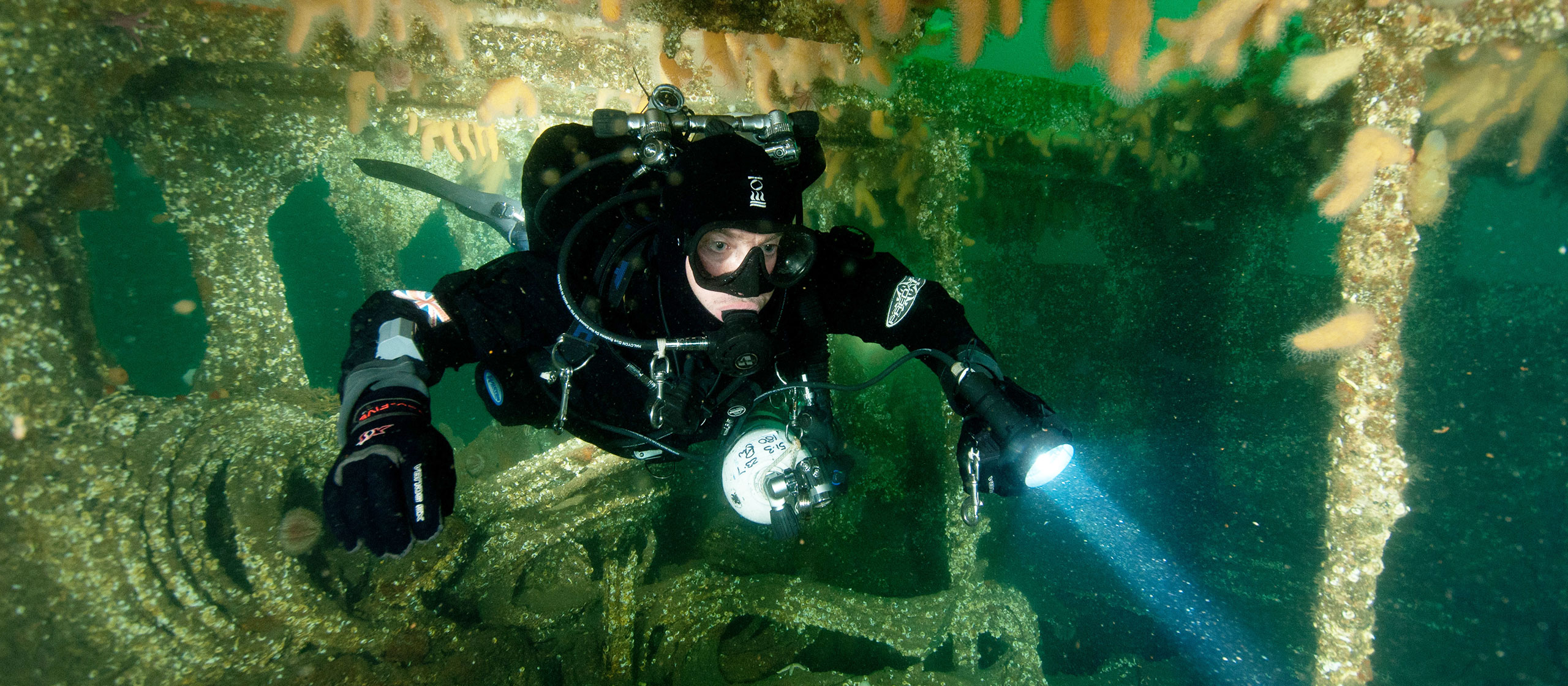Dive stories
How to Improve Your Diving Safety and Performance
This September, British human factors expert and technical diver Gareth Lock, will be hosting the first “Human Factors in Diving Conference,” for a global online audience. The virtual conference, which will run for two days, 24-25 September 2021, will provide an in depth look at what the science of human factors is all about, why it is important, and how you can apply it to improve your and your team’s diving safety and performance.
Nearly 30 world-class speakers, from diving and other high-risk industries such as aviation and health care, will discuss how they have created positive change, sometimes when faced with significant challenges and how attendees can be inspired to create change in their own diving, and their diving community. One of the speakers, anesthesiologist and editor of Diving and Hyperbaric Medicine, Dr. Simon Mitchell, has described human factors as the most important topic today for modern sports diving.
Over the last decade, 50-year old Lock, who is a retired senior officer Navigator from the British Royal Air Force, has been tireless in his efforts to bring aviation’s rich body of knowledge of human factors and their impact on safety and performance to the sport diving industry. His company, The Human Diver, offers a variety of in-person and online courses and webinars, in addition to Lock’s book, “Under Pressure,” and the documentary, “If Only,” about a tragic avoidable accident that took place during a diver training course in 2018. In 2019, he started training an international group of human factors diving instructors, five of whom are qualified now and four more are almost certified to train divers.
We reached out to Lock to ask him about the conference, how divers can benefit from human factors knowledge, and the various options for attending this unique event. Here is what he had to say.
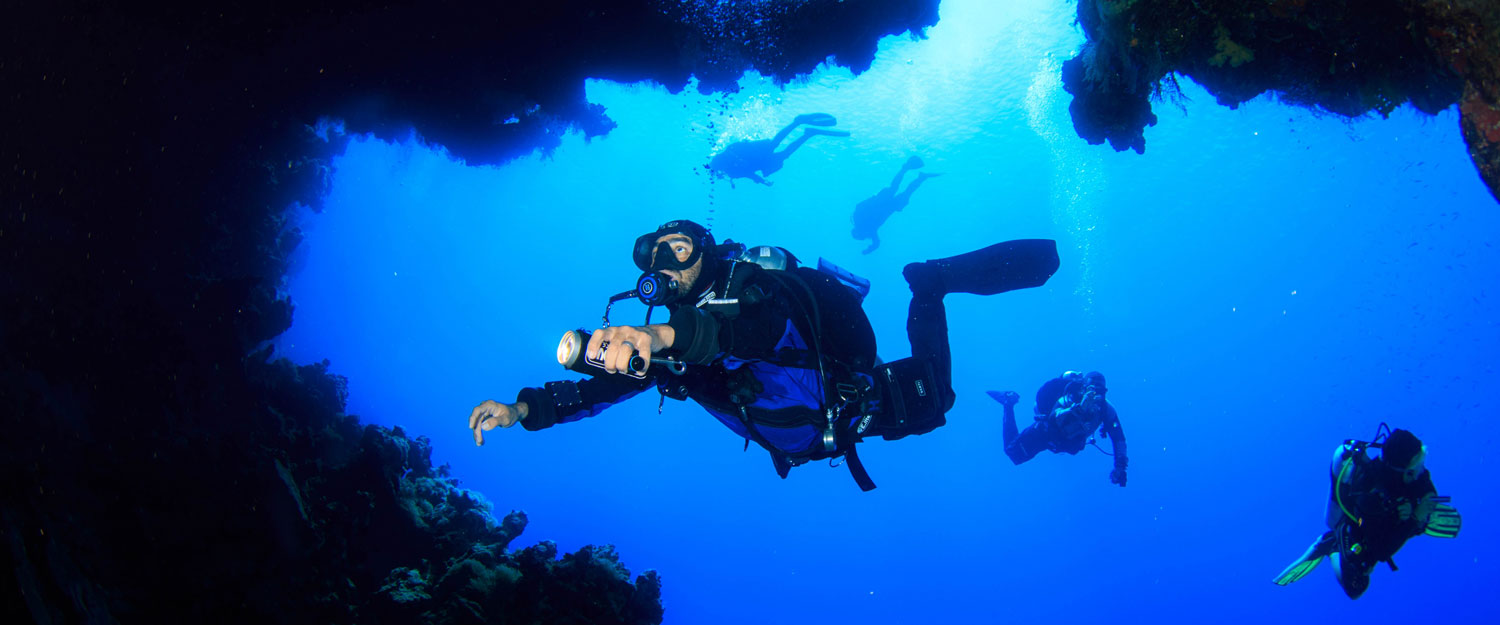 Photo by Jenny Lord
Photo by Jenny Lord
DAN Europe: Gareth, perhaps you could start by explaining to our readers what are human factors and what do they have to do with diving performance and safety?
Gareth Lock: It's a great question. One of the difficulties about human factors is that it's such a wide topic, and it’s generally applicable to many environments. At its highest level, it is how people interact with technology, with other people, and with the environment, along with things like training manuals, processes, and procedures. The goal is to make it easier to do the right thing and harder to do the wrong thing.
That sounds “right” to me, especially in diving.
One of the things that's come out of the science of human factors, and it is a recognized science, is understanding that our behaviors are massively influenced by the system in which we are operating. So, if you design a piece of dive equipment from strictly an engineering perspective, you know how it is supposed to operate. But if an ordinary user gets a hold of it, and consistently makes the same mistakes using the unit, well, that's a human factors issue. The problem is you have to take into account how a human will actually interact with it.
Similarly, if you're consistently having failures, faults or things keep going wrong with a training program, then it’s not an issue of an individual student with a learning problem it's a system problem. And so, the aviation, healthcare, oil and gas, and nuclear industries, all recognize that we need to design systems with human performance variability in mind, which is really a posh way of saying, we make mistakes.
That’s one of the sobering truths of our humanness, isn’t it? We make mistakes.
Exactly. We are not consistent in how we execute things. If you design a system, be it hardware, a training system, or a process, based around optimal conditions, then you are immediately setting people up for failure, because there is so much variability in the individual and group performance.
To counter this, we need some form of feedback, be that quality control or quality assurance inside a training system or, once you're outside the training system, an incident reporting system that allows you to capture the details and context of what happened that tells a story of how it made sense for a user or diver to do what they did.
So we can get into the diver’s head to figure out why it made sense to them at the time?
Right. I know there are a number of very emotive topics on social media at the moment about diving accidents and fatalities. Critics looking from the outside go, “That is just absolute madness, why would they do that? Let's throw the book at them for being totally negligent.” However, that negligent activity doesn't exist in and of itself. It grows and it develops. What we need are systems that allow us to understand that drift (from a norm) is happening. I wrote about this in a recent article in InDepth, “Drift is Normal. Being a Deviant is Normal. Here’s Why.”
So when we do make mistakes, we don't die from them? I get it. We need systems designed to prevent and or help catch those mistakes and so minimize their impact?
That’s right. Here is a great quote from a colleague of mine in the States, a guy called Todd Conklin. He said, “Safety is not just the absence of accidents and incidents. Rather it is the presence of barriers and defenses and the capacity of a system to fail safely.” The barriers and defenses he refers to, in the context of diving, are the training programs, equipment manufacturers, the CE process, the testing process. We've got to recognize that we're never going to have perfect humans; there's always going to be a possibility of something going wrong.
“Safety is not just the absence of accidents and incidents. Rather it is the presence of barriers and defenses and the capacity of a system to fail safely.”
So, we've got to look at how do people fail safely? That could mean that they still get injured, but they don't die— they don't have a catastrophic failure. The capacity to fail safely could be about teamwork, or having a rescue option, having oxygen, or insurance, or having a hyperbaric chamber nearby.
That means we have to look at both sides of the accident ‘event’. There’s something that could go wrong—what do we do to reduce the probability of occurrence so that it's as low as possible, but noting that you're never going to get to zero unless you don’t dive. We then look at what could happen, i.e., an accident has happened, and consequently, how do we make sure that it's not a catastrophic failure.
That's a great way to look at it; before and after an incident.
You’ve told me that the technical training agencies have broadly adopted the concept of human factors, but it seems like there is less awareness in recreational circles. I suspect there are some readers going, “Yeah, human factors. I’ve heard of that but that’s for technical, and commercial and military divers. I'm just a recreational diver. What does it have to do with me?”
Brilliant question. Interestingly enough, I've had somebody recently who was thinking about joining my current 10-week human factors program and they said, “Well, I'm just a recreational diver.” And I said, “Interestingly enough, of the 22 people in the two morning and evening classes I have running, I would say that 10 of them are recreational divers. Be that a diver, a dive master or an instructor in the recreational domain.”
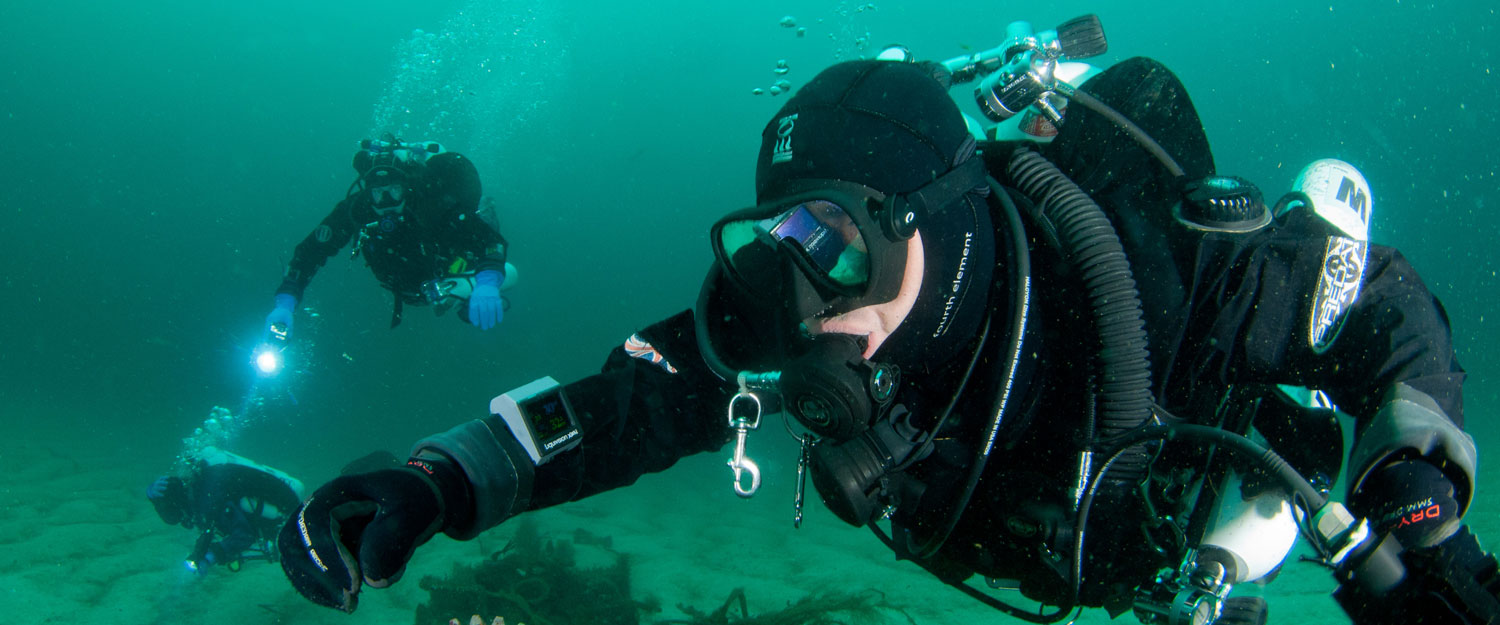
They are divers. It’s equally applicable, right?
That’s right, and they're all recognizing that there are things that they could do better in terms of their decision-making and understanding how they make the decisions that they do. Communications is a potential critical failure point, because that's how we pass information along. When we are stressed, we make greater assumptions on the part of the other people. We cut down the conversation, and make an assumption that the other person knows what we're talking about. It’s a teamwork issue. Who's doing what, when and why, and what happens if something goes wrong on the dive?
Another critical part is the team’s psychological safety, the ability to thumb a dive at any time for any reason. That premise is accepted in technical diving circles. But that same premise applies in the recreational diving as well.
That's the key part of a good buddy system—you stay together, and if one person is not happy about it, you both go up.
If somebody sticks their thumb up, you don't say, “See you! I'm on my own.” Because now you’ve just eroded a whole bunch of your safety margins that were in place.
As divers, we need to be able to question what’s going on?
Yes. We've got to create a culture, a social environment where people can ask those questions and say, “Is this really what we're doing,” without feeling stupid or really small in the process. It’s up to the leadership, whether it’s the instructor, dive master, dive guide or skipper of the boat, to create the social environment that allows people to ask questions and challenge what is happening.
So, human factors are totally applicable to recreational diving as much as technical diving. Just because they're not doing deep, dangerous diving, it doesn't mean that the risks or the hazards are missing. They're just getting a little bit more severe.
Right. Humans can’t breathe water, so if you're in 10 meters of water or 100 meters, you are potentially still at risk.
Totally. And I would ask the readers this question: Have there ever any times that you wished that you could have ended the dive but you didn't, and then you felt really bad afterwards? Michael, I know from your example in the book, “Under Pressure,” that you have experienced that. And that wasn't a technical dive, it was a recreational dive that was going on. I know for a fact, that there are lots of people out there that wish, in hindsight, that they had done something different on their dive.
Amen to that! Fortunately, I survived to tell the tale and learned something as a result!
The whole point of these programs is to set people up for success so they can make better decisions, and they can communicate more clearly. The idea being that they can develop their own knowledge, so they've got the experience to be able to question or challenge. In effect they're learning from somebody else's mistakes. There's a quote that I put on one of my early marketing posters which said: “It's great to learn from your mistakes, but it's better to learn from somebody else's. Because you can’t make all those mistakes yourself.”
“It's great to learn from your mistakes, but it's better to learn from somebody else's. Because you can’t make all those mistakes yourself.”
In fact, that’s another one of the biases that limits us when we say, “I'm not like that person, I'm different. I wouldn't make those same mistakes.” However, you need to examine why? We're all wired the same way, and so we behave much the same way.
You've introduced a couple of terms to the diving lexicon; “psychological safety,” and “Just Culture.” Just culture is what we're talking about ,of course. Perhaps you could elaborate on these.
Yes, the first term is psychological safety, which is the proactive bit. That’s the environment we create that attempts to stop or minimize adverse events or accidents from occurring. We feel included, we feel we can make minor mistakes and learn from them in a positive way. We are able to contribute as part of a team, and ultimately, we can challenge the plan if things are going wrong. That's the proactive side.
The Just Culture component is reactive. It requires psychological safety to be able to talk about this stuff, of course. But if we have had an accident, or made an error, or something went wrong, people will judge us for being incompetent. The idea of a Just Culture is recognizing that everybody is fallible and makes mistakes. It's very easy to focus on what went wrong, but that rarely helps us learn. We need to be able to understand how people made the decisions and took the actions they did at the time, so we can learn from them. That’s Just Culture.
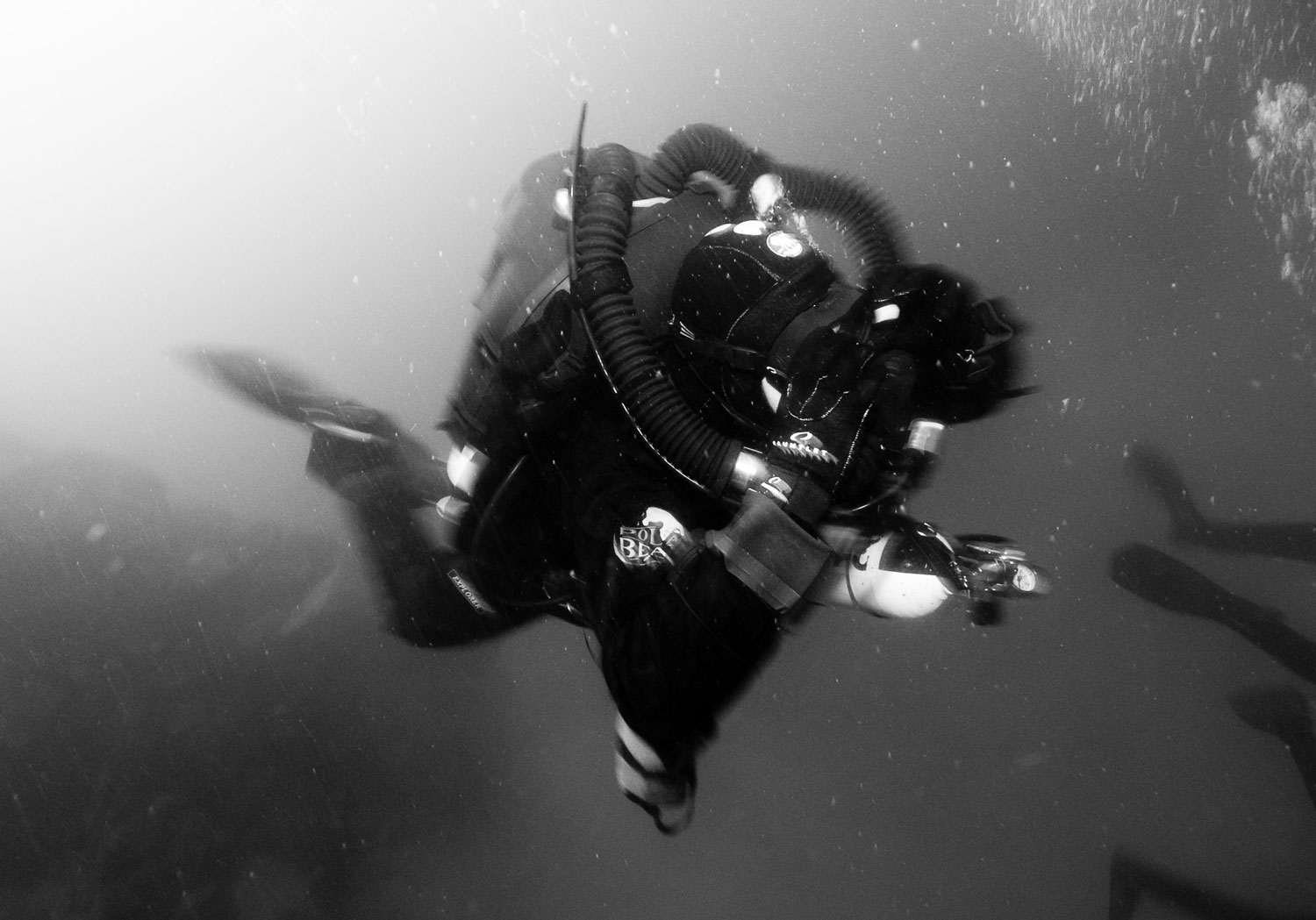
So how is the dive community doing in terms of creating psychological safety and Just Culture?
To answer your question, we are getting better. If I look back to where we were, say 10 years ago, across social media, things have certainly changed. And the term Just Culture is out there now and people are saying, “Right, let's look at this.”
The difficulty is, we see a minor or middling incident where something went wrong, we say, “Yeah, yeah, people are fallible,” and we recognize and try to apply a Just Culture. But when something goes seriously wrong, like people are killed and or there's multiple potential fatalities, then we revert back to the old blame model.
Because as humans, we have a severity bias. The more severe the outcome, the harsher we judge it, and when someone dies, every goes Ah-huh! And if there's a supervisor involved or an instructor—someone in charge—then we immediately point to them and say, “Bang them up in jail, because they are incompetent and negligent.”
Well, hang on a minute! Let's look at some of the things that led to the incident. What were the conditions? What organized or arranged behaviors and conditions led to that situation happening? Because you could stop time five seconds before that serious event occurred, and the learning would still be there.
So we don't have a Just Culture yet. We still can't talk about those things, because as soon as people start talking about breaking the rules, bending stuff that's going on for their own gain, then we actually start into the blame game, and “blame is the enemy of safety.“ That’s a quote from Dr. Nancy Leveson, who is a professor of Systems Engineering at Massachusetts Institute of Technology (MIT).
“Blame is the enemy of safety.“
That's a great quote. You offer human factor training through The Human Diver, and now you’re launching first human factors conference in the diving industry. What motivated you to organize a conference?
I’m glad you asked. I have done [human factors] training and development work with some friends in the healthcare and the veterinary medicine domain. In January, they launched the first veterinary medicine human factors conference. I sat on my bum for ages thinking about what they had done, and then I realized that I had to do something.
So, I wrote to a number of people from diving and other industries and basically said, ‘Look, I know you’ve got good stories to share about how human factors impacts and influences what you do, and how it could impact divers, are you interested in sharing that knowledge.’
I actually wrote to about 30 people. My idea was to bring together a whole range of diving and a whole range of different aspects of human factors. I figured that I had 30 slots for talks over a two-day period. There was a really enthusiastic response.
It looks like you have scheduled a fascinating and diverse group of speakers over the two days.
I have. No surprise that I got Professor Simon Mitchell from New Zealand to talk about human factors in health care healthcare and how healthcare can inform the diving industry.
Dr. Mitchell is perfect. He’s not only a diving and hyperbaric medicine doc but also a major tech diver and he led an international healthcare study which looked at the efficacy of checklists in the surgical suite. I’m sure his talk will be eye opening. Who else do you have lined up?
I've got the ex-head of safety culture for British Petroleum, a lady called Diane Chadwick-Jones, who was involved in changing the culture within British Petroleum following the Deepwater Horizon disaster. We have a astronaut trainee and ex-commercial airline pilot whose going to talk about what it's like to bridge the gap between diving, aviation and space and what we can all learn from each other.
I've got somebody from the Norwegian military, Commander Geir Gundersen, who has developed and implemented his crew resource management and human factors training into their military diver programs.
Then there’s Tim Andro from the Northeast Public Safety Divers (PSD) community who's done a training course with me, and who wants to look at how we bring human factors into PSD. He’s gonna to talk about rebuilding a PSD team following a fatality and all the non-technical skills and human factors that went into that
But it's not just the high-end stuff. We have people, for example, one of my instructors, Helene Pellerin, who is a diver and anesthesiologist based up in Québec City, Montreal. She's going to talk about how we present human factors to novice divers. And I've got Mike Mason, who is a military flight instructor in Australia and a dive master and he's working to apply Human Diver materials into his job as a dive master. So, it’s basically the full width and depth of human factors in diving; there is literally something for everybody.
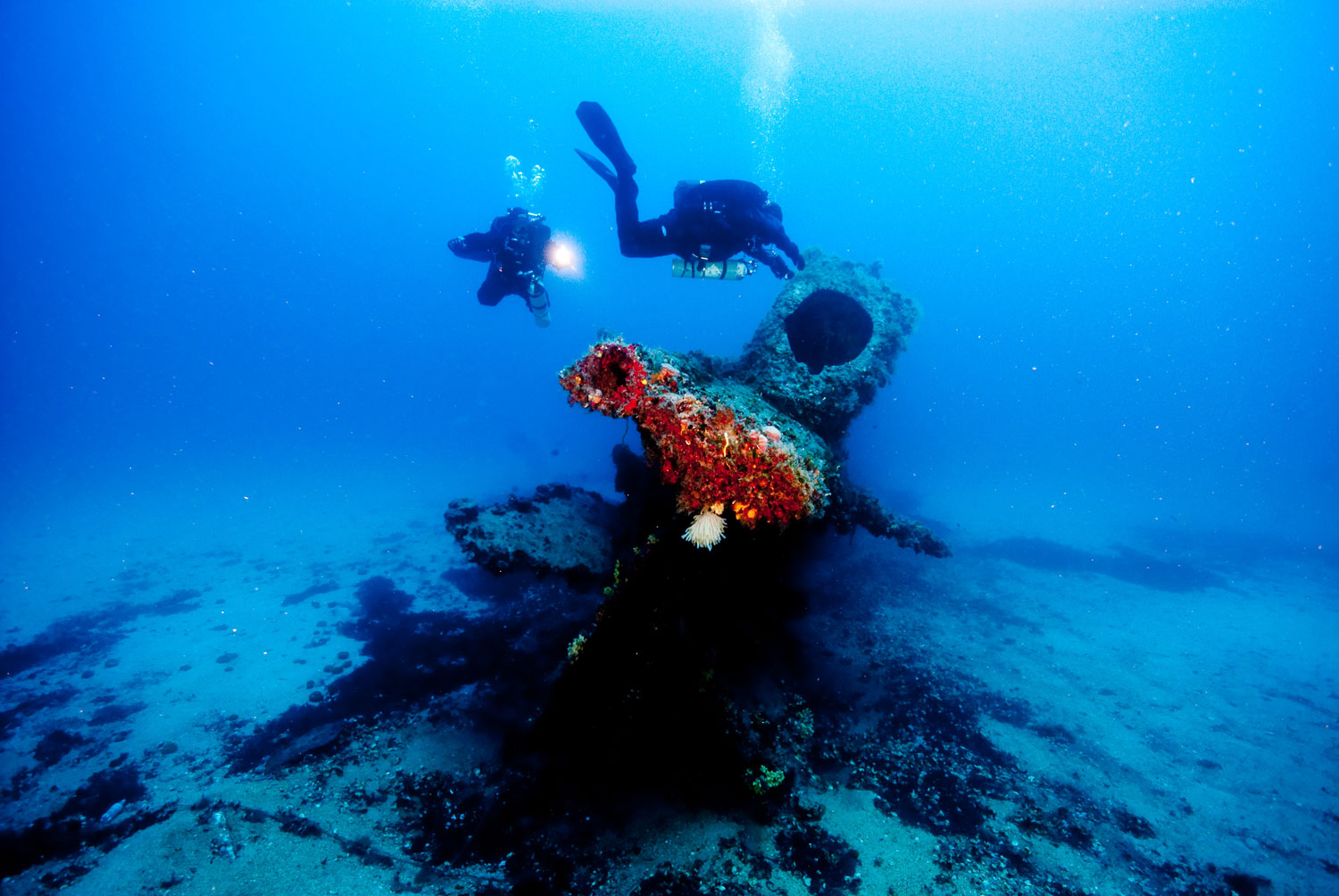
Wow, wow and wow! I think getting a perspective from other high-risk industries on safety and how they are applying human factors to their application will be fascinating.
Given the state of the global pandemic, you’re going to be holding this as a virtual conference. How will the event actually work?
Yes, that’s right. It's a virtual conference that is going to be held on a new socially-oriented meeting platform called LexGo. It was recommended by one of my high-risk training colleagues, and it's designed to be a social activity. So, there's no chat window, everything is done through video and microphones. The event will be set up as a conference center with a lobby and two presentation halls.
Participants can talk and socialize in the lobby. There are also virtual tables in the presentation halls so you can sit next to your friends and colleagues. Your screen will have the presentation on the bottom two-thirds, and there will be video thumbnails along the top, so you can actually talk with colleagues while watching the presentations. We will also have a number of tables designated as “quiet tables,” where there won’t be talking. Attendees can also get up and also join another table, or leave the presentation hall, and chat with people.
There are 30 presentations all together. There’s also a virtual bar but I'm not going to there to supply anything! You’ll have to bring your own drinks, err virtual or otherwise!
It sounds like you have really thought it out and taken the idea of a virtual conference to the next level past holding a big Zoom meeting. Again, the conference is for all divers, right? It doesn't matter if you’re rec, tec, dive professionals?
Yeah. It's for all divers that are out there. There will be a lot of content given
that it's across eight hours a day over two days and you've got presenters across the globe coming in live. One of the criticisms of many face-to-face meetings and conferences is that one can’t be at all of the presentations. So we’re going to make sure that all of this knowledge is captured in two ways.
First, all of the presentations are going to be recorded. So, attendees can buy a live-only ticket that gives them complete access to all conference presentations. Then there’s a live-plus-recording ticket, where you will have access to the event and recordings of all the presentations that you can watch at your leisure.
I am also working with DAN Europe, as you know, to produce a written proceeding of the conference, that will be available for members before the end of the year. All of the speakers will submit a written version of their presentations.
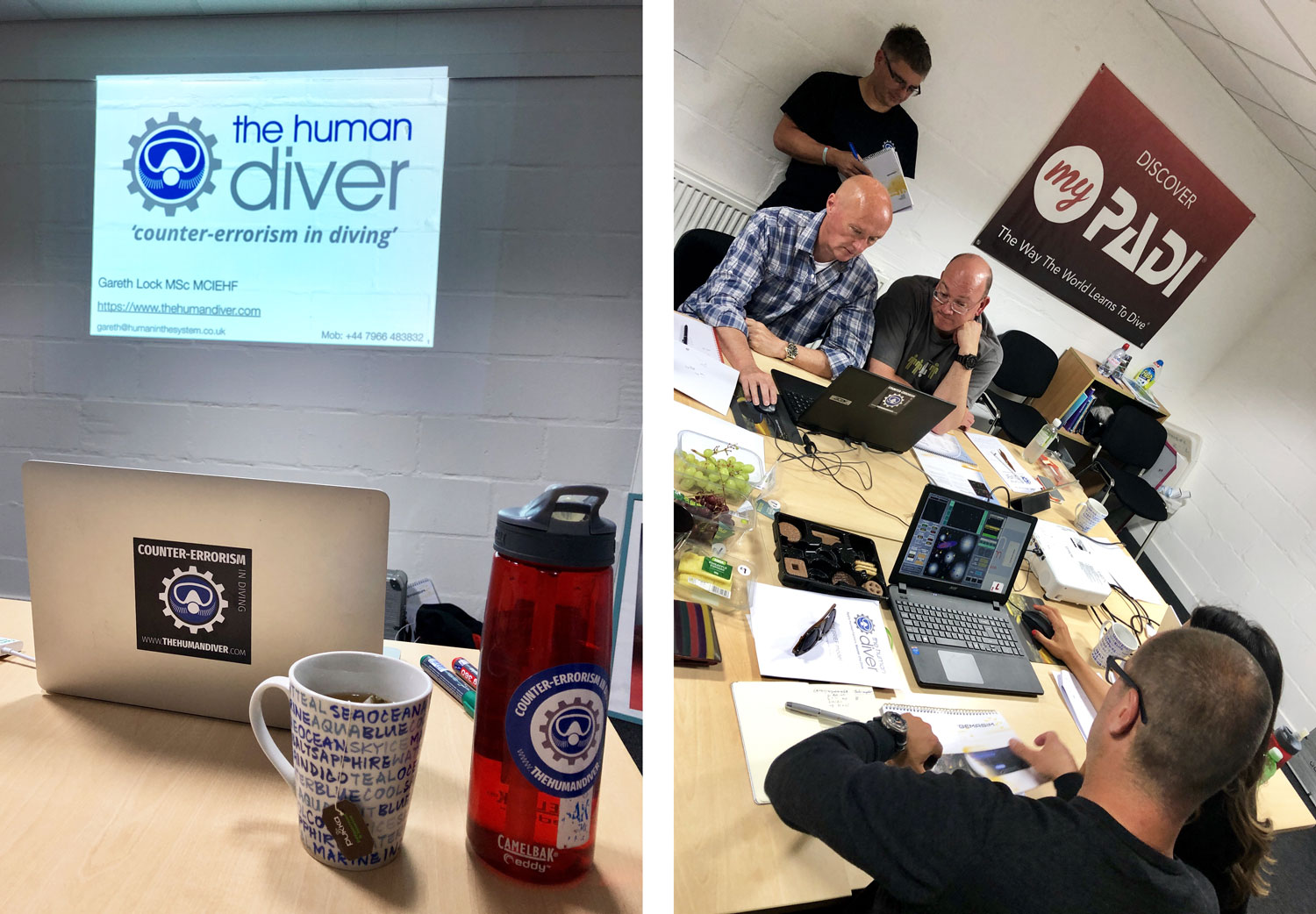
That should be very valuable! So how do interested divers sign-up?
The easiest link is Human Factors in Diving Conference or they can go to The Human Diver website and click the conference logo in the middle of the page.
They can find a schedule of the talks there?
Yes indeed.
Thank you, Gareth. We’ll see you at the conference!


